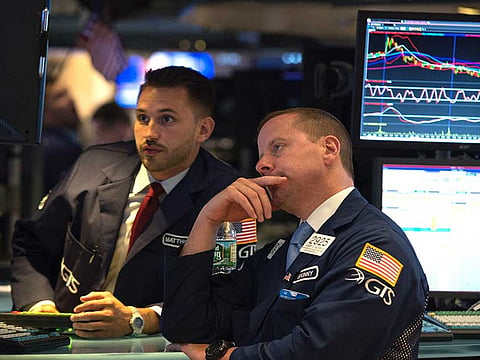US stock markets will see sharp corrections as debt concerns mount
US companies are carrying too much of debt for their own good – and that’s a risk

The most dramatic parallels between the roaring 1920s, the 80’s, the 90’s and now is the repeated hand wringing over the prospects of financial crises brought about by debt.
Traditional corporate finance theory stipulated then - as it does today - that adding debt increases efficiency to the company, and forces managers to be more prudent.
Then, as now, asset managers showed that the quickest path to build equity was through leverage. However, in an essay in the 1980s, the then Professor Bernanke stated: “Using high leverage to improve corporate performance is much like encouraging safe driving by putting a dagger pointed at the diver’s chest; it may improve driving but it may equally lead to disaster during a snowstorm”.
In the stagflation of the 1970s, 10% of large US companies went bankrupt in their inability to service their liabilities.
In the 1980s, the ratio of debt servicing increased to 26%, last seen in the 1920s. That figure has since risen to nearly 40% in an era of zero interest rates that prevailed for more than a decade following the sub-prime crisis.
Of course, during this time, stock market valuations obscure this burden as they have been at historic highs. But despite the recent pronunciations at Jackson Hole, the tendency to talk of stagflation risks have increased significantly, especially as these discussions have been conflated with warnings of US national debt servicing.
What history shows us is that these worries have been with us for some time, and this is why the frequency of financial boom-bust cycles have increased. Then, as in now, Wall Street was innovating new ways to create money.
Then, as in now, regulators were playing the game of catch up.
Debt is not a habit to break free from
But in all instances, the imbalances in the world financial markets were a precursor to some process of painful mean reversion. (In the case of the 1920s, it took two decades. In the 1970s and in the 2007 bust, it took a decade).
Yet, it is equally true that the markets picked themselves up only to exacerbate the imbalances even further. With the private credit phenomena, these imbalances have most recently shown up in the German housing market.
The story in all cases has been that:
The party will keep on going even if there is some turbulence along the way.
Doomsday talk ignores the effect of technology.
That may be true, but every period of financial history has some differences. And this one has been the prolonged era of zero interest rates that has turbocharged the demand for fixed income accumulation.
A 2024 study by the US Federal Reserve stated that the prospects of stagflation would be at least in an order of magnitude twice as damaging as the 1970s.
For the UAE corporate sector, debt levels are nowhere close as to where they are in the US and Europe. And the recalibration that we have seen towards emerging markets and particularly in the Middle East is expected to continue.
Equally, we know that financial markets are a web - subtract one filament and everything becomes weaker for some time. There is also the rise of private credit, a factor to look out for, especially in the real estate sector as well as in some of the more highly levered corporates.
As the focus turns to debt levels once again, the broader lesson is that the world’s financial markets will have to correct again. More to the point, with the Trump tariffs now showing up in prices, and slowing growth, trade deficits will probably reduce somewhat.
However, by that time that it bears fruition, we will probably wish that it didn’t.




